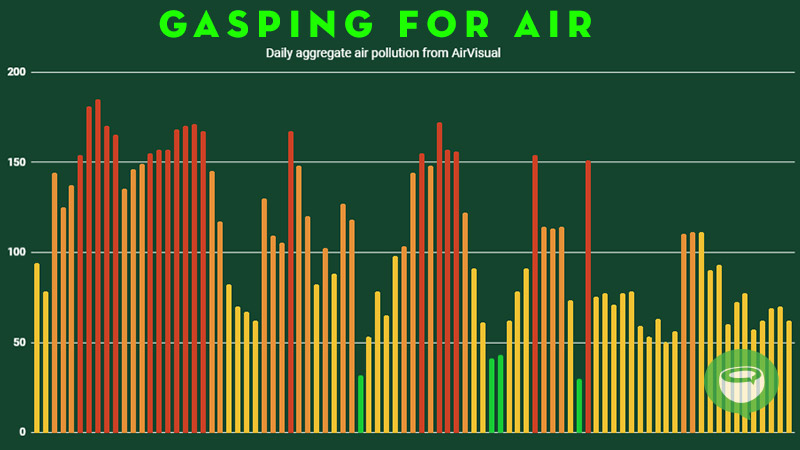Thailand is grappling with a health crisis impacting daily life like no other – and then there is the COVID-19 pandemic.
While the virus is rightly the top health concern, that other thing killing us – no matter where we go or how far apart we stay – continues unabated.
Air quality in Bangkok has only been considered “healthy” four of the first 100 days of 2020. The other 96 days have been either “acceptable” (41), “moderately unhealthy” (33) or “unhealthy” (22), according to daily aggregate measurements from AirVisual recorded mid-day since Jan. 1.
March 15 recorded the best day with an AQI of 30. Jan. 8 was the worst, at an “unhealthy” 185. Bangkok’s AQI averaged a moderately unhealthy 96 over the first 100 days.
Though the price in lives that will be paid due to the coronavirus is yet unknown, it is likely that millions more will die this year around the world from health conditions caused by poor air quality. The World Health Organization believes air pollution plays a role in an estimated one-third of stroke, lung cancer and respiratory disease-related deaths, worldwide.
The combination of the two may prove especially deadly. A Harvard study published Wednesday found higher exposure to small particle pollution, aka PM2.5, dramatically increases the chances of dying from COVID-19.
“A small increase in long-term exposure to PM2.5 leads to a large increase in COVID-19 death rate, with the magnitude of increase 20 times that observed for PM2.5 and all-cause mortality,” researchers concluded. “The study results underscore the importance of continuing to enforce existing air pollution regulations to protect human health both during and after the COVID-19 crisis.”
Though Bangkok’s air is already beginning to show seasonal improvement, the persistence of smog despite lower economic activity and traffic suggests agricultural burning is a far greater source than auto and other emissions. The lackluster government response reliably blames emissions and “weather.”
While Bangkok has coughed through the first quarter of 2020, it can’t compare to the foul conditions shrouding the north, where Chiang Mai consistently appears in the top three of most-polluted cities worldwide.
As of early Friday afternoon, Chiang Mai city was an “unhealthy” 155. The mountain holiday escape of Pai was on the high end of the “very unhealthy” range at 276.
While farmers are blamed for reckless burning, most do so to grow corn for animal feed and domestic consumption on the behalf of major agricorps.
Related
Masks On! Bangkok smog is back from the holidays
Thailand launches crackdown on emissions to cut smog
Thai gov’t blames weather, vehicles for hazardous smog




